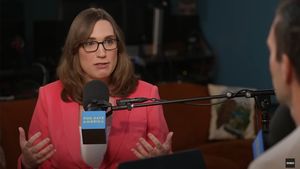Twenty-five years ago, my pregnant mother received her HIV diagnosis when a nurse callously told her, "You have AIDS and you're going to die." She was devastated and wasn't even aware that women could contract the virus. Little has improved in terms of education and resources available for youth of color. Throughout my life I have encountered the same misinformation, ignorance, and stigma my mom faced in 1994. That's why National Youth HIV/AIDS Awareness Day--a day to educate the public about the impact of HIV on young people and elevate the work of youth activists in the fight for HIV prevention, treatment, and care--is so important to me.
I remember a health class in high school in which the lesson that day was about HIV transmission routes and the instructor informed us that HIV could be transmitted through a can of soda. Shocked, I politely, yet firmly, let him know that that was absolutely untrue. After going back and forth for a while, I realized that my point would not get across to my instructor. Fortunately, my classmates listened and affirmed me and that was all that truly mattered.
As someone who was born to a mother living with HIV, I was exposed to conversations and information that many of my peers were shielded from. I thought of myself as a natural-born activist because of my situation, and it was important to me that others have medically accurate information.
People tend to have a knee-jerk reaction when it comes to comprehensive sexual health education, discussions about access to condoms, and prevention methods such as pre-exposure prophylaxis (PrEP), a once-daily pill regimen that can help a person remain HIV-negative. Young people are often infantilized and denied proper, life-saving information because it goes against the supposed morals of their parent or medical provider. But a variety of statistics continue to remind us of the need to center and support young people, especially LGBTQ+ youth.
Young adults make up 41 percent of new HIV infections, with the Latinx gay community seeing a 17 percent increase in new cases between 2012-2016, and the Black gay community with a 9 percent increase in the same time frame. Young women of color are also contracting the virus at increasing rates; Black and Latinx teens account for 79 percent of all infections among youth aged 13-19 and 75 percent of infections among women aged 20-24.
The support that I received from my peers about HIV misconceptions reflect studies that show that young people themselves are dissatisfied with the state of sex education. They know they're being left in the dark, so when they reach out to to satisfy their inevitable curiosity, we must ensure they're getting facts, not fantasy. When information about HIV and sex education is approached with inaccuracy and shame, LGBTQ+ youth face violence, increased risk of negative health outcomes, unhealthy relationships, bullying, and discrimination.
Today, I am an HIV Prevention Coordinator and youth activist that works with young people on HIV and sex education issues. My work and my life experience have taught me that young people need comprehensive and accurate sex education. We need access to condoms, to HIV testing, and to medications like PrEP that can help us prevent HIV. We also need policymakers to listen and support communities that are most affected by their sex education, HIV prevention, treatment, and care policies.
Since my mother got her diagnosis, so many things have changed. It is no longer the death sentence she was forced to reckon with. We've learned more about the virus, how to prevent it, and how to keep HIV positive people healthy for decades. With all this advancement, we cannot ignore where we still need to improve. We need educators, parents, and healthcare providers to catch up with science and provide young LGTBQ youth and youth of color the positive, affirming support we deserve. We cannot let young people be left behind as casualties of our progress.
Jamanii Brown, 23, is an STD/HIV Prevention Coordinator at CrescentCare in New Orleans and an activist with Advocates for Youth's YouthResource team.
RELATED | How Strict Abortion Laws Are Restricting Lesbian Parents Like Me




















































































School Sex Ed Is Awful — That Disproportionately Harms LGBTQ Youth
“When information about HIV and sex education is approached with inaccuracy and shame,' writes sex educator Jamanii Brown, "LGBTQ+ youth face violence, unhealthy relationships, bullying, and discrimination."